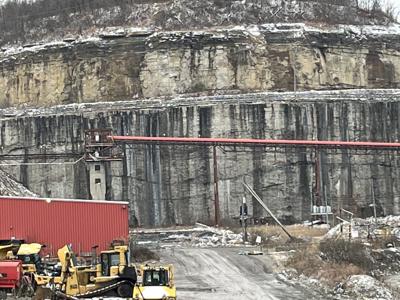Federal regulators will finalize a rule poised to make it easier for citizens to report concerns about surface coal mining operations.
The Office of Surface Mining Reclamation and Enforcement, or OSMRE, announced Thursday that it will make significant changes to its Ten-Day Notice rule that addresses potential violations of coal mining laws, regulations and permits.
One change to the enforcement tool will remove language requiring a citizen to first contact a state regulatory agency before contacting the OSMRE to report a possible violation of federal law that regulates surface coal mining.
That suggests less reliance for West Virginians on the state Department of Environmental Protection, which many anti-mining conservationists and environmental advocates have viewed as a rubber stamp for the coal industry, in reporting concerns with mining operations.
āThis is very good news for citizens like us who struggle with a Department of Environmental Protection that finds any excuse to avoid tangible enforcement,ā Vernon Haltom, executive director of Raleigh County-based anti-surface mining group Coal River Mountain Watch, said in an email Thursday.
Sierra Club senior attorney Peter Morgan predicted the new rule will empower communities to alert regulators of violations at coal mine sites for prompt action as Congress intended under the Surface Mining Control and Reclamation Act, the 1977 federal law that created the OSMRE and regulates the environmental impacts of coal mining.
āThis rule offers the oversight needed to improve the well-being of people living near coal mining sites,ā Morgan said in a statement.
The Ten-Day Notice is named as such because it gives state regulators 10 days to respond to the OSMRE of their findings if the OSMRE determines thereās reason to believe a violation exists after the federal agency gets information about a potential violation.
The OSMRE listed excessive dust from operations, pollution reaching water supplies and noise levels exceeding those approved in a permit as potential violations in its announcement of the rule update Thursday.
The rule update follows 2020 changes to the rule under the Trump administration that environmental and health advocates found objectionable. The Trump-era changes included differentiating Ten-Day Notice enforcement from oversight of state permitting programs.
Tighter DEP enforcement followed notice last year
But DEP permitting oversight of a Boone County mine permit for which the agency extended a notice of violation over two-dozen times changed quickly after the OSMRE issued a Ten-Day Notice last year.
Stories you might like
- Proposed budget reconciliation energy cutbacks expected to slash WV jobs, raise bills
- Morrisey, DEP and developer panned by residents at meeting on expected data center
- Justice coal firm owes $916K in delinquent DEP fines as he backs debt-adding megabill
- MSHA: Operator caused death at Raleigh County mine with history of safety failures
The DEP extended a violation notice issued to Lexington Coal Company, a mine operator chronically delinquent in paying DEP fines for frequent environmental violations, for failure to reclaim highwall at its Twilight MTR Surface Mine 25 times from August 2021 to August 2023.Ģż
The DEP renewed the companyās permit for the mine in January 2023 despite objections from environmental advocates. The agency extended the violation notice throughout summer 2022 despite its records indicating Lexington had ceased reclamation activities from June until September.
In July, Coal River Mountain Watch, joined by environmental groups Appalachian Voices and Sierra Club, requested that the OSMRE review DEPās oversight of the Twilight MTR Surface Mine.
The groups objected to what was then a 737-day extension of the violation notice, citing a state legislative rule holding that an operator must establish āby clear and convincing proofā that they should get an extension of a violation.
The OSMRE issued a 10-day notice on Aug. 8, 2023 telling the DEP in a letter a federal inspection would occur and āappropriate enforcement actionā would be taken if the latter agency didnāt act to cause the violation to be corrected.
The DEP said in an Aug. 25 letter to the OSMREās ĀŅĀ×ÄŚÉä field office the extension had been āerroneously grantedā and wasnāt in accordance with DEP Division of Mining and Reclamation policies.
The DEP noted it had modified the violation notice to a cessation order on Aug. 24, a day earlier, and called the extended violation āan anomaly that will be corrected.ā Climatic conditions shouldnāt have been deemed acceptable criteria in extending the violation, the DEP said.
ā[The DEP] chose to apply their āanomalyā to dozens of violations across dozens of permits,ā Haltom said Thursday. āIn doing so, the āanomalyā of breaking the law to benefit a coal company became their policy.ā
But the DEP objected in the letter to the OSMREās measures leading up to the 10-day notice issuance, contending it had issued the notice prior to determining whether the agency was acting in good faith to correct the violation. The OSMRE had acted in āthe exact opposite of the spirit of cooperative federalism,ā the DEP said in the letter signed by Division of Mining and Reclamation Assistant Director Nicki Taylor.
The new rule, which will take effect 30 days after publication in the Federal Register, also:
- Adds language providing that all citizen complaints be considered as requests for federal inspections
- Drops the requirement that a citizen is required to state the basis for their allegation of a possible violation
- Lets OSMRE issue a single Ten-Day Notice for similar possible violations found on two or more permits.
CLICK HERE to follow the ĀŅĀ×ÄŚÉä Gazette-Mail and receive











